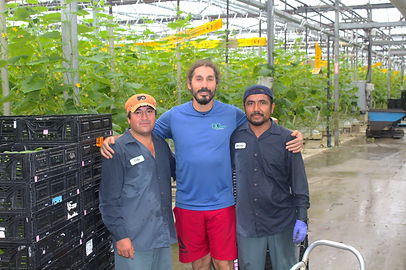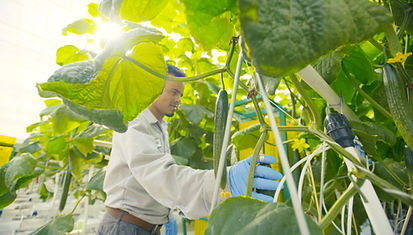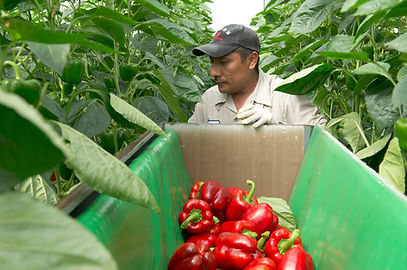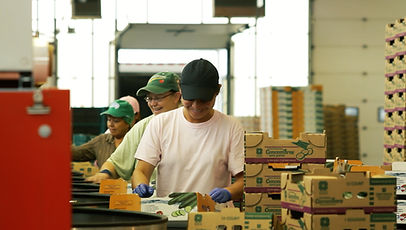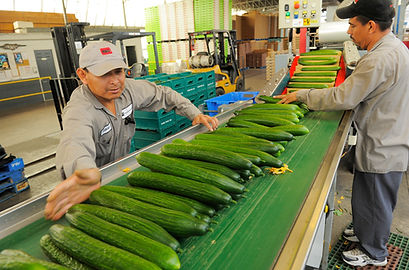OGVG in the News
-
GREENHOUSE GROWERS SUPPORT THIRD PARTY BODY FOR WORKPLACE COMPLAINTS-Aug 17, 2020
-
OGVG GM Joe Sbrocchi on the Dan Macdonald Show July 31, 2020 -Audio
-
Windsor Star Article - Farmers Furious at being portrayed as bad guys July 22, 2020
-
Windsor Morning with Michael Del Ciancio from DC farms July 16-Audio
Misconceptions about the Temporary Foreign Worker Program (TFWP) and the Seasonal Agricultural Worker Program (SAWP)
Last updated Oct 3/2020
Watch or visit https://youtu.be/QEt7lqqc8bw to learn first hand from an international worker talk about his experiences with coming to work on a Canadian farm and the benefits to his family.
SAWP and the Agricultural Stream of the TFWP are two programs used by farmers to attract and hire international farm workers. These are longstanding programs that allow international workers to come to Canada for relatively short periods of time. These programs are highly regulated by the federal government, and are further subject to provincial workplace regulations to ensure the workers enjoy the same legal protections as Canadian workers. The programs have slightly different rules, but both have rules that are implemented to protect the rights of employees.
-
Is it true that farmers are providing sub-standard or poor quality meals to employees that are in isolation due to testing positive to COVID-19?
FACT:In his public address on July 3rd 2020 Premier Doug Ford had indicated the deployment of Emergency Management Ontario (EMO) and the Red Cross in an effort to assist the local health unit. For some time the Red Cross and others, have had the responsibility of assisting and providing meals to all employees who are in isolation due to testing positive with COVID-19.
The well-being of our employees, especially those who have tested positive, is of utmost importance to all of our growers. OGVG and its membership are willing to assist the EMO and Red Cross in their efforts.
However, it is our belief that due to COVID-19 protocols put in place by the Red Cross and other groups, our farmers have been prohibited in assisting the provision of meals for their employees. It has been reported that food delivered has been discarded, and potential fines would be imposed if members visit designated areas of isolation.
Any report of the malnourishment of our workers is deeply concerning to OGVG and its members, and we ask all parties involved for a coordinated effort to focus on the health and safety of our employees in isolation.
For further information on the guidelines and responsibilities in regards to workers that have tested positive, please visit the link below provided by the Ontario Ministry of Agriculture, Food, and Rural Affairs. https://www.ontario.ca/page/working-farm-operators-stop-spread-covid-19-farms#section-3
-
Are International workers taking jobs away from Canadians?
FACT: We always aim to hire locally first. Every position filled by an international farm worker is advertised locally and on the Canada Job Bank.
-
Is it true that greenhouse workers are paid less than minimum wage?
FACT: SAWP/TFWP rules and regulations guarantee that international workers are paid minimum wage or better – in greenhouses and all other areas of agriculture. It is the law.
-
Are greenhouse environments dirty and unsanitary?
FACT: Even prior to COVID-19, all greenhouse farms had to adhere to strict food safety rules and sanitation is a key aspect of those rules. These regulations are also enforced by such organizations as the Canadian Food Inspection Agency, that regularly do surprise visits.
-
Are agricultural workers respected by their employers?
FACT: Many international workers return to the same farm year after year. In some cases, multiple generations and/or family members had returned to the same farm. In many cases relationships are built and friendships are formed. The Canadian Horticultural Council has compiled a series of videos on YouTube outlining these stories. https://youtu.be/vcHbPJme_iU
-
Is it true that greenhouse employees are crammed into tiny living environments?
FACT: Depending on the program, international workers are either provided housing by their employer or are ensured access to affordable housing in the community. All housing is inspected the local Public Health Unit at least annually. In addition, housing must also adhere to local fire, building and zoning bylaws.
-
Is it true that after their workday, employees are locked in their residences and not allowed to leave?
FACT: Like Canadians, international workers are free to spend their time outside of work in the ways they choose, including engaging in extracurricular activities like everyone else. Workers are not confined to their residences.
The greenhouse sector promotes extracurricular activities and in addition to on-farm amenities, has contributed to the implementation of community centres, social groups as well as festivals. As part of our COVID-19 workplace planning tools, all employees are urged to undertake social distancing even outside of the workplace and especially when they are going into the community.
-
Are Farmers not monitored, and not punished for non-compliance?
FACT: Non-compliant employers are fined, placed on probation, or excluded from the SAWP and TFWP programs in the future, if they fail to meet the program’s high standards.
Penalties for not complying with the new COVID-19 regulations include fines of up to $1 million and bans on using the SAWP and TFWP programs, which can be made permanent.
In addition, each farm is heavily inspected by the local health unit, the Ontario Ministry of Labour, Training and Skills Development and Service Canada.
Further, the consulates of the workers’ respective country will at times visit farms to verify the well-being of their nationals.
Workers are able to contact each of these oversight agencies to flag any non-compliance, and the agencies have a mandate to follow up on such complaints.
-
Are workers being barred from testing? Do they have the same rights as Canadian workers?
FACT: Every worker has a legal job contract signed by them and the employer. This protects the worker, giving them all the same human rights and protections as Canadian workers, including Employment Insurance, and WSIB.
This also gives workers the right to decide if they wish to be tested. They cannot be barred or forced to be tested. It is their right to volunteer to do so.
International workers that test positive for COVID-19 and are isolated and have access to wage coverage through WSIB benefits, just like Canadian workers.
-
Do greenhouse environments have employees working right next to each other?
FACT: There are over 3,200 acres of vegetable greenhouses across Ontario. With an average of three employees per acre, social distancing is easy in the greenhouse.
In areas where closer contact may be inevitable, physical barriers and increased sanitation and PPE have been implemented as prevention measures. This is in addition to operational changes such as staggered shifts, having employees work in small teams, and amenity scheduling.
-
Do agricultural workers have access to healthcare?FACT: All workers have the same access to health care as you or I under either public or private insurance. SAWP workers are covered by provincial coverage (e.g. OHIP in Ontario) upon arrival in Canada. For the remaining TFWP workers, where there is typically a waiting period before OHIP coverage kicks in, employers are responsible for purchasing private coverage for the worker equivalent to provincial coverage. This waiting period has been temporarily waived to ensure workers are covered against the risks of COVID-19 upon arrival.
-
Did foreign workers arrive with COVID-19?
FACT: Upon arrival to Canada all greenhouse employees were required to self-isolate for 14 days. To date all on-farm COVID-19 outbreaks have been a result of community spread, meaning it was brought into the farm from community contacts.
-
Are International employees working as forced labour? Are they only contributing to the pockets of the farm owner?
FACT: In addition to contributing to their local economy, over $300 million of saved earnings are sent home by employees every year, over eleven times Canada’s annual aid budget to developing regions like Mexico and the Caribbean. Seasonal jobs provide workers the opportunity to send their kids to good schools, buy medication, buy a home, and start their own family business. https://youtu.be/F3YxnKQT4KU
In some cases, monies saved have been used to build schools and churches. https://youtu.be/v-h8CcBru2Y
-
Is it true that the greenhouse sector supports the use of undocumented workers to save on operational costs?
FACT: We do not support the use of unscrupulous recruiters who operate outside of the law. Such recruiters are not subject to compliance and enforcement activities that ensure housing conditions are up to standard and that wages meet provincial and federal requirements. This is unacceptable and will take the concerted effort of all levels of government and the sector to address this complicated issue. We have repeatedly offered to work with municipal, provincial, and federal officials to rectify gaps presented by this situation.
Please refer to the following documents in regards to our correspondence with our local Members of Parliament regarding this issue. -
Do International employees have a path to immigrate to Canada permanently?
FACT: Immigration rules are set by the government. Not by farmers. That said, we are fully supportive of any pathway of immigration for workers choose to pursue that. International greenhouse workers have access to both the Ontario Immigrant Nominee Program and recently announced Agri-Food immigration Pilot. https://youtu.be/gM2t2ApYwZU
-
Are employees tied to a single employer? Do they have the ability to change?
FACT: Workers in the SAWP program have long been able to move to another employer. There is a long-standing transfer mechanism.
In addition, the federal government has introduced Open Work Permits for Victims of Abuse which empowers workers in the rest of the TFWP to leave their employer in any abusive situation.
Transfers must be done in orderly ways like the above examples to ensure international workers don’t end up taking a job that a Canadian was willing to do.
-
Do workers have no access to COVID-19 related information?
FACT: Employers relay all COVID-19 related information to their employees as soon as they receive it. In addition, the sector has a mobile application called Hub-Connect, which is used as an informational resource to the foreign worker community. This free application is available on Apple and Android platforms, and contains valuable information regarding Health and Safety, including COVID-19, in English and Spanish.
-
Is there the ability for employees to complain about employers?
FACT: The Government of Canada, the Government of Ontario and the consulates of the workers’ countries all have a combination of online, email and phone avenues for workers to report abuse or misuse for the Temporary Foreign Worker Program. In addition, specific guidance has been provided to report employers who are not respecting COVID-19 guidelines.


